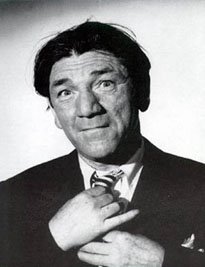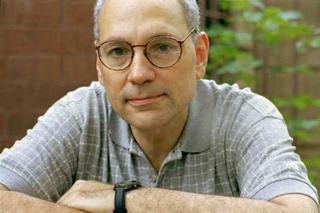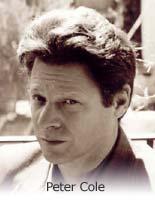***
42 down, 23 to go, I can't help but think. My father lived on a 65-year clock, based on everything he knew of his own father's and mother's and grandfather's early deaths. And, alas, he was eerily accurate, dying just a few months shy of his 66th birthday. Of course, I could take after my mother's side of the family, in which case it's 42 down and another 55 to go, and maybe more. My grandmother is still going strong at 97, God bless her, and she's the source of my poetry genes. Still, on this grey Chicago morning, zoned out on Sudafed, it's hard to be as upbeat as she is, or as I'd like to be.
***
I haven't thought much about Jewish poetry recently, or about things Jewish more generally. Too much competition from other fronts, perhaps? I've been pleasantly busy since Thanksgiving on various Romance Fiction projects--grant proposals, novels to read--to the point where I'm prepared to say, with Keats, that my only religion is the holiness of the heart's affections. Well, those aren't quite his words, a quick Google search tells me. "I am certain of nothing but the holiness of the heart's affections and the truth of imagination," saith this Preacher. "What the imagination seizes as beauty must be truth - whether it existed before or not."
That sounds deeply right to me tonight, and reminds me that whatever else I end up writing on Jewish American poetry this year, I want to muse awhile on the Jewish denomination that no one talks about, much: Jewish Romanticism, or Romantic Judaism, which folds Blake and Keats and Stevens and sometimes even Yeats into its theological rugelach. I'll keep you posted when this gets into print. In fact, you'll probably read it here first.
***
Here at home, of course, religion is very much in the air. I may have mentioned here before that my wife is Catholic, although we're raising the kids as Jews. Most of the year, this seems a workable arrangement, but every now and then--not always around a holiday, but often enough--the strain of it starts to show. When my first child was born I tried to police things, keep Christian stories and symbols to a minimum around the house, until I saw how sad--not angry, not frustrated, but a lonely sort of sad--this made my wife, for no reason worthy of the pain. (I thought it was pretty funny that my toddler son didn't even know who Santa was, and called each one he saw "Noah" instead.) Over the last six years or so I've tried to lighten up, but I still stiffen and bristle, sometimes consciously, sometimes without knowing it, when Christmas and Easter come to town. Blame it on my youth: too many years of having to sing religious carols in public elementary school, which stuck in my craw despite my parents' shrugs and soothing words. (I was also the kid who crossed his fingers during the Pledge of Allegiance, so they couldn't hold me to it.) Anyway, some tough days recently here, sorting it all out once again.
I don't actually think that it's the specifics of Christian theology that rub me the wrong way, or even the figure--the character? the idea?--of Jesus. Like any number of rebellious Jewish teens, I was obsessed with JC for a while, and I still occasionally find the easy, streamlined personalism of Christianity, the nameable, imaginable Interface-With-Deity it offers, quite inspiring, although I prefer my own mix of multiplicity (lots of titles and nicknames to deploy) and utter mystery (Yo, He-Who-Must-Not-Be-Named! I'm talking here!). I think it's more what strikes me as a particularly Christian tone: a sweetness, a sincerity of belief--a focus on belief in general, maybe?--which brings out the scoffer and blasphemer in me faster than you can say "Purimspiel." When I see a creche set with an empty cradle, I can't resist the urge to put something silly at the center--or, better yet, to shift the shepherds and Wise Men and Holy Family around until they're having a pleasant cocktail party chat, in little groups, blissfully inattentive to the vigil at hand. (My daughter now has taken up this game, much to my joy and my wife's chagrin.) As a result, no matter how much my wife now tries to educate the kids in Christian doctrine or practice, she knows--with no small regret--that they view it all from the outside, as they do the stories about Hanuman and Krishna that they sometimes hear from me. This year, maybe for the first time, I've gotten a sense of how estranged from the rest of her own family that leaves her, even as we pile up presents and sing carols and the rest.
Intermarriage: not for the faint of heart!
***
I'd meant to close tonight with one of my favorite Jerome Rothenberg poems, "Visions of Jesus," from Khurbn. Alas, the DePaul library website is down, and I have no copy of it handy. (Ooh! Could this be a sign?) I'm too tired, and a little too glum, to take up Jackie Osherow's new book, The Hoopoe's Crown, which I've read a couple of times in the last two days. It deserves me at my sprightliest--maybe tomorrow, then. Here's a scrap of Reznikoff for inspiration, then, for all of us hard workers at family, at poetry, at anything: Poem 19 from Five Groups of Verse (1927).
After I had worked all day at what I earn my living,More soon, I promise.
I was tired. Now my own work has lost another day,
I thought, but began slowly,
and slowly my strength came back to me.
Surely, the tide comes in twice a day.
E
***
P.S. And the LORD spoke unto me, saying "Check the library website one last time." And lo, I did check, and there it was again, by gum. Seek and ye shall find, knock and the door will open, ask and it shall be given, as they say.
So--here 'tis: Jerry Rothenberg's "Visions of Jesus," from Khurbn and the New and Selected Poems. Enjoy.
Let's say it was Jesus. Who is Jesus? Why should Jesus be the name
now celebrated, entering the poem?
Or let's say it wasn't. That I have the key to make it open
like a sound. Each sound's a rage.
Each page a turning over. I am writing this
the way a preacher speaks the word out on a prairie.
Visions of Jesus everywhere.
Sweet Jesus, says the song, to which the mind says
archly, darkly, "sour Jesus,"
& the poem begins with that.
Pink Jesus. Tiny Jesuses
on every bush, the world of sagebrush now a world of tiny Jesuses.
Soft Jesus maybe. (Is there a sexual aspersion in it
or only another way of saying "tender Jesus"?)
Jesus in Oklahoma
with his beard cut off. A weepy girl
named Jesus. She opens up her breast,
the moon pops out. O menses, colored glass
& papers, birds with messages
of love, tra la, on metal wings. His other name
is Rollo, Baby Winchester
or Baby Love. Jesus with a cow's head
on his shoulders, candles reaching from
his fingertips. Jesus in his one-eyed ford.
Squawk squawk, the preacher cries.
Eyes of the congregation turning white. The pinwheel
shooting sparks against his lap.
Jesus in furs. Jesus in Oklahoma,
growing old.
Hot & glowing Jesus. Jesus on the ace of hearts.
Alfalfa Jesus.
I am writing this the way a gambler cuts his name
into the table. Jesus in formica.
Drinking in the morning, playing coon-can
with his brother James.
Other names of Jesus.
Jesus H. Jones or Jesus in the woodpile.
Tomtom Jesus.
Jesus who aims a bullet down his mouth.
His children hang his body from a cross.
Three Jesuses in Ypsilanti.
Three in Tishimingo.
Jesus buried in Fort Sill.
His suffering has left their bodies
empty. In the night sky past El Reno
Jesus becomes his pain & flies,
aiming to leave his eyes for others.
Mother Jesus.
Her children have forsaken her.
She learns to cry & plays
nightly at mah jong, dropping her tiles
into the bottomless lake.
The man who chews his wrists down to the bone
is also Jesus. Jesus
in a feathered skull cap. Tacking stars
onto his vest, o cockeyed Jesus,
wanderer from Minsk,
he squawks the language of the little merchants,
squatting at their campfire he stirs
their coffee with his tool. How like his grandfather
he has become. Coyote Jesus.
Farting in the sweat lodge, tight
against his buttons
in the bride's room. Ponca City
Jesus. Pawnee Jesus.
He is staring at the eyes of Jesus
staring into his.
Their eyeballs spin around
like planets.
Visions of Jesus everywhere.
Gambler Jesus.
Banker Jesus.
Flatfoot Jesus with a floy floy.
Jesus shuffling.
The soldiers guard his silent fan,
tacked up, beside his rattle.
Jesus on the pavement. Jesus
shot for love, the powpow over,
naked, crawling toward you,
vomit on his beard. His father's milk
is dribbling---plin plin---in the cup
called Jesus. Ghosts
unhook the breast plate, draw
two streams of milk out,
mix them, opening
the mother's womb. No midwife
comes to her, she gives birth
like a man, & holds him
in a dream. Old song
erupting in the gourd dance,
in the storefront church
at night, among the hapless
armies. Two plus two is
Jesus. Five is Jesus.
Jesus in Okarchie,
driving. Jesus in his one-eyed ford,
arriving for the dance in Barefoot.
Visions of Jesus everywhere.
Jesus wrapped up in a woman's shawl.
Jesus in a corner,
stroking his tight body.
Masturbating Jesus.
Jesus sucking on a ball of fat.
There is no language left for him to speak,
only the humming in his chest,
a rush of syllables
like honey. Pouring
from every orifice, the voice
of renegades & preachers
without words.
Pink Jesuses in Oklahoma,
emerging with the spring.
Catfish Jesuses.
A beetle with the face of Jesus
scribbled on its back, squashed flat
against the dance floor.
Jesus squawking with the voice of angels.
I am writing this the way a man speaks without words.
Wordless in the light he pulls
out of his mouth. In the holes he hides in.
Wordless in praises. Wordless in peyote.
Wordless in hellos & hallelujahs.
The freaky Jew slips in beside
his bride, asleep forever, counts up bears
& cadillacs
under a leaky sky.
OK: that's a day's work and then some. Off to bed, and happy erev birthday to me.






